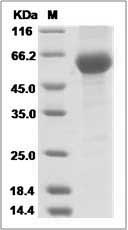-
Product Name
Mouse PLA2G7/PAFAH (His Tag) recombinant protein
- Documents
-
Description
Platelet-activating factor acetylhydrolase, also known as 1-alkyl-2-acetylglycerophosphocholine esterase, 2-acetyl-1-alkylglycero-phosphocholine esterase, Group-VIIA phospholipase A2, LDL-associated phospholipase A2, PAF 2-acylhydrolase, PLA2G7 and PAFAH, is secreted protein which belongs to the AB hydrolase superfamily and Lipase family. PLA2G7 / PAFAH modulates the action of platelet-activating factor (PAF) by hydrolyzing the sn-2 ester bond to yield the biologically inactive lyso-PAF. It has a specificity for substrates with a short residue at the sn-2 position. It is inactive against long-chain phospholipids. PLA2G7 / PAFAH is a potent pro- and anti-inflammatory molecule that has been implicated in multiple inflammatory disease processes, including cardiovascular disease. PLA2G7 also represents an important, potentially functional candidate in the pathophysiology of coronary artery disease (CAD). Defects in PLA2G7 are the cause of platelet-activating factor acetylhydrolase deficiency (PLA2G7 deficiency). It is a trait which is present in 27% of Japanese. It could have a significant physiologic effect in the presence of inflammatory bodily responses.
-
Protein short names
PAFAD; PAFAH; LP-PLA2; LDL-PLA2; R75400; PLA2G7
-
Uniprot ID
Q60963
-
Source/Expression Host
Human Cells
-
Expression Plasmid/cDNA
A DNA sequence encoding the mouse Pla2g7 (NP_038765.2) (Met1-Asn440) was expressed with a polyhistidine tag at the C-terminus.
-
Protein Species
Mouse
-
Molecular weight
The recombinant mouse Pla2g7 consists of 430 amino acids and predicts a molecular mass of 48.3 kDa.
-
Purity
> 90 % as determined by SDS-PAGE.
-
Validations

Mouse PLA2G7 / PAFAH Protein (His Tag)
Related Products / Services
Please note: All products are "FOR RESEARCH USE ONLY AND ARE NOT INTENDED FOR DIAGNOSTIC OR THERAPEUTIC USE"
